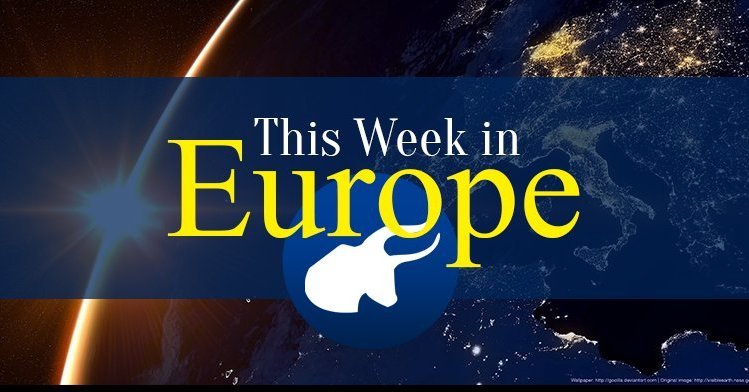Spain to exhume Franco
On Friday, the Spanish government green-lighted a request to dig up the remains of Francisco Franco, the former dictator who launched a coup against the elected government of Spain in 1936 and ruled the country until his death in 1975. Franco had been buried in the Valley of the Fallen mausoleum near Madrid, where 34.000 victims of war and repression are also buried, but now the government, backed by the recommendations of a 2011 UN commission and a 2017 decision by the Spanish parliament, wants to exhume the body. Franco’s descendants have been attempting to block the exhumation, calling it a “trick to win votes for the left.” Deputy PM Carmen Calvo, on the other hand, says that Spain “can’t have the dictator in a place of honor” and that Franco “will go wherever the family wants.”
Brussels commits €18 million to the Iran deal
On Thursday, the European Commission approved a support package meant for Iran. The money will go toward the preservation of the nuclear deal, despite U.S. sanctions. The €18 million is meant to meet Iran’s economic and social challenges and to counter the effects of economic sanctions that were re-imposed by the United States. Out of the entire sum, €8 million will go toward the private sector, specifically, to promising small and medium enterprises. Another €8 million will go toward dealing with environmental challenges and a further €2 million is to be committed to drug harm reduction. This is only the first part of a €50 million aid fund.
A few weeks ago, the Trump administration’s re-imposed sanctions against Tehran came into force. As a result, the EU activated its “blocking statute” to soften the blow, meaning that EU companies and residents are banned from complying with US sanctions.
Paris knife attack leaves 2 dead
On Thursday, a man equipped with a knife killed two people and injured at least another in the Paris suburb of Trappes. The attacker was known to the police and had been convicted for advocating terrorism. He was shot and killed by the police during the attack. Shortly thereafter, the Islamic State claimed responsibility for the attack. A clear terror link, however, was not established, and the French Interior Minister cited “severe psychological issues” as a possible motive, along with a dispute in the attacker’s family.
European Space Agency launches satellite into space
On Wednesday, as part of the Copernicus project, the EU and the European Space Agency launched a rocket from the French Guyana in order to put a satellite into orbit. From 320 kilometers above the Earth, the “Aeolus” satellite will track global winds, environmental damage, aid disaster relief operations and will allow for improved weather forecasting.
Europe sees increase in measles cases
During the first half of 2018, Europe has witnessed a sharp rise in the number of measles cases, amounting to 37 deaths, out of which 14 just in Serbia, according to the World Health Organization. Most cases appeared where the anti-vaccination movement has also been extremely active - Ukraine and Serbia. In total, during the first six months of 2018, 41,000 cases of measles were reported in Europe, compared to almost half that in 2017 and just over 5,000 in 2016. While half of the cases in 2018 were located in the Ukraine, countries with more than 1,000 cases include France, Italy and Greece. The reason may very well have to do with the vocal anti-vaccination groups who use famous people as representatives of their cause. In their opposition to vaccination, these groups cite globalist influences or those of an occult pharmaceutical mafia. According to data amassed by Serbia’s Public Health Institute, the country faces the biggest measles outbreak in the last 25 years, with 94% of those infected having been unvaccinated.
UK: EU citizens get to stay even if no Brexit deal
According a government document leaked by the Telegraph, EU nationals will be granted the right to stay in the United Kingdom even in the event that no deal is reached regarding Britain’s exit from the European Union. Regardless of what Brussels will do for British citizens living in EU countries, EU citizens will be able to live in the U.K., access its health system and claim benefits. The leaked paper is only one of a series of documents detailing a no-deal Brexit scenario.
Greece exits rescue programme
On Monday Greece reached a milestone in its recovery from the financial crisis, marking the end of the bailout programme. It has taken 8 years and €326 billion and the programme has faced sharp criticism from those who say Greece’s economy has been damaged for the long-term. The austerity drive that marked European politics in the early 2010s was a cure that proved almost as dangerous as the disease, causing unemployment to spike up to 28%. Defenders maintain that there was no easy option for Greece, a country whose path was already set following decades of economic mismanagement by successive national governments. To ease Greece into recovery, eurozone members have offered a further €34 billion and have postponed payments on a large amount of the debt which Greece owes.
Salvini under investigation
The Italian Deputy Prime Minister and Interior Minister, Matteo Salvini, has been formally placed under investigation over this handling of the arrival of a ship carrying over 100 migrants and refugees. Salvini had declared that none of the passengers aboard the rescue ship would be allowed to leave until other European states agreed to take most of them. Prosecutors have announced that Salvini will be investigated for forcibly holding the people hostage. Albania has agreed to take in 20, Ireland will welcome 25 while the Italian church said it would take in the rest.
Germany moves towards immigration reform
The German interior ministry has presented key points for a new immigration law. Though the details are not yet decided, the law aims to liberalise immigration policy and to open up Germany. The document notably focuses on ‘skilled workers’, most likely involving non-EU migrants who may have vocational training but not a university degree. Refugees, however, appear not to be covered by the new proposal, in spite of the fierce argument over refugees between elements of the CSU and the CDU which propelled this immigration review in the first place.


Follow the comments: |
|
